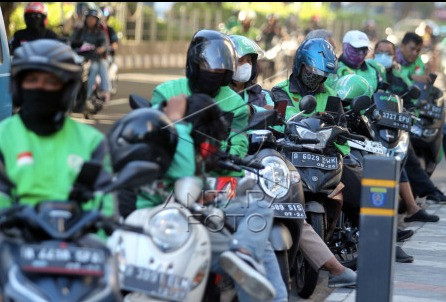Popular Reads
Top Results
Can't find what you're looking for?
View all search resultsPopular Reads
Top Results
Can't find what you're looking for?
View all search resultsThe cries of labor should be heeded amid the digital economy thrills
Governments, companies, and civil societies, must work together to build a fair and sustainable digital economy where everyone, including workers, enjoys the rights and well-being they deserve.
Change text size
Gift Premium Articles
to Anyone
I
n the rapidly evolving digital era, the digital economy sector has emerged as a new frontrunner, shaping the global economic landscape. The contributions of laborers in this digitalization process are undeniable, as they remain the backbone of the giant digital platforms, delivering goods and food, and serving customers with dedication.
However, ironically, behind the glitz and glamor of the digital economy, the well-being of laborers seems to have taken a back seat. Data from the humanitarian organization Yayasan P2K shows that 52 percent of digital laborers in Indonesia work beyond the maximum working hours, 63 percent do not receive adequate health insurance, and 71 percent do not have clear employment contracts.
The digital economy, which was touted as bringing prosperity to all parties, has instead become a loophole for worker exploitation and labor rights violations. Impersonal algorithms and digital platforms often trap laborers in an unfair system. Long working hours with low wages, a lack of social security and fragile employment contracts are the harsh realities faced by digital laborers.
In this digital age, it is important to remember that behind the sophistication of technology and ease of access, humans are working hard to make it happen. The well-being of digital laborers cannot be ignored. There is a need for clear and strong regulations to protect their rights, and for digital platforms to be more responsible in treating their workers.
Only by ensuring justice and well-being for laborers can the thrill of the digital economy become a blessing for all parties, not just a handful of people at the top of the digital pyramid.
Beneath the gleaming façade of the digital economy lies a grim reality for workers. This era, heralded as an age of progress and convenience, has instead become a fertile ground for exploitation and labor rights violations.
Platform digital workers, the silent cogs in the machinery of giant digital economies, toil for hours on end without fair wages, social security or adequate legal protection. For instance, an Oxford University study revealed that 40 percent of online motorcycle taxi drivers in Indonesia work more than 12 hours a day, earning an average of less than Rp 100,000 (US$6) per day.



















